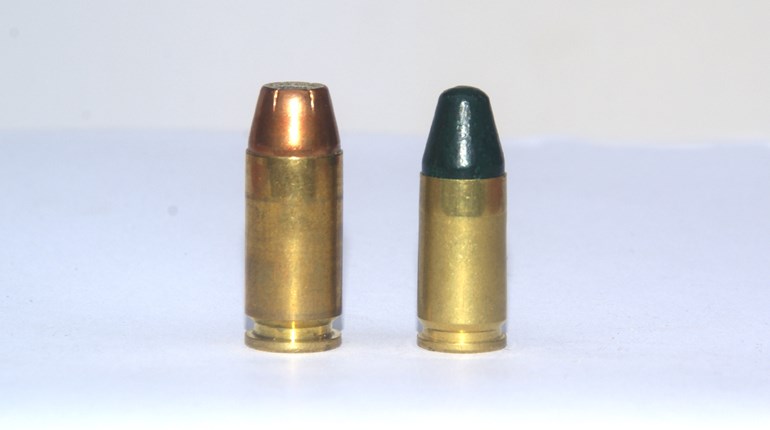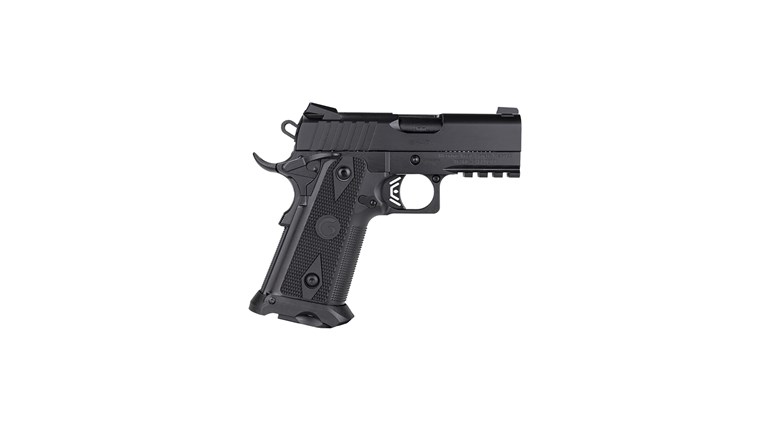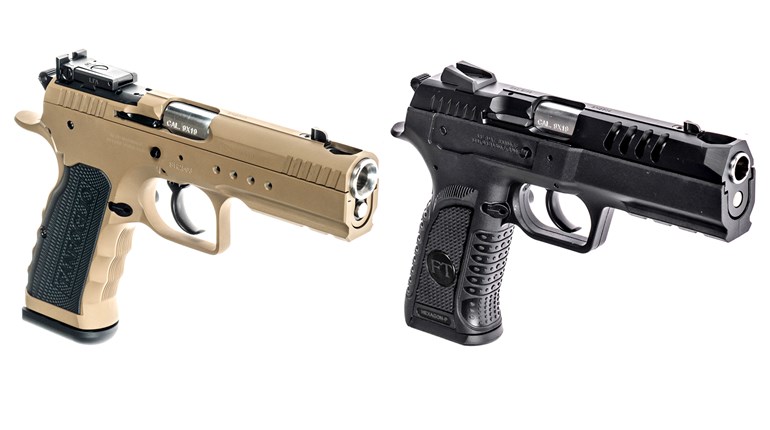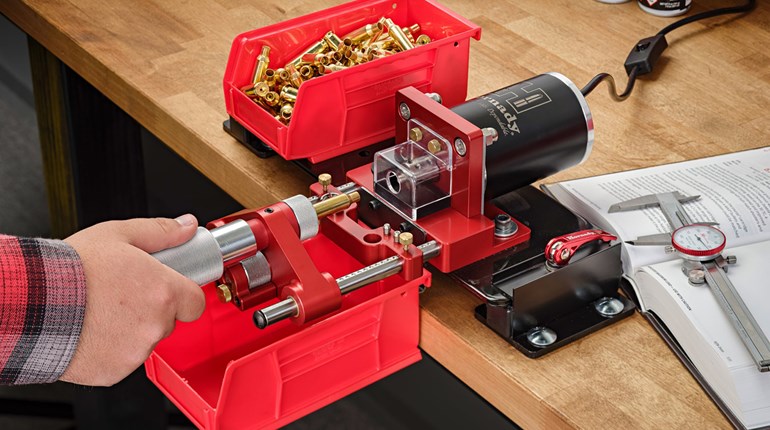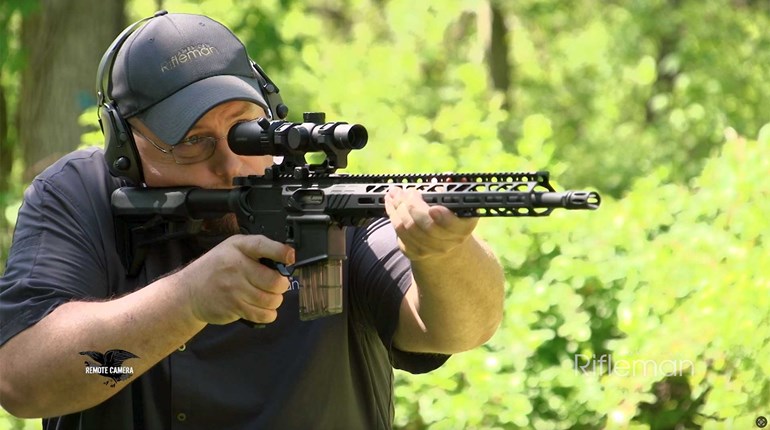
If you happen to be carrying the same ammo as officers working for the San Diego, Phoenix and Portland city police, you should be making the right decision.
In 2002 Federal Premium introduced a new line of LE ammo, which was intended for—and sales were restricted to—law enforcement. This "tactical" ammunition featured a new bullet designated "HST." Some hypothesized the abbreviation stood for "Hi-Shok Two," but in reality it was just a name. It was, however, a name that, during the last 10 years, has gained a stellar reputation on the street. This should not come as a surprise considering bullet-engineering guru Tom Burczynski, of Hydra-Shok and EFMJ fame, worked on this new project.
According to Larry Head, senior manager of ammunition product development at Federal, "The HST was developed specifically to meet performance requirements, such as FBI protocols that many police departments and government agencies were requesting—specifically to get larger expanded diameters without sacrificing penetration."
Meeting these requirements is often accomplished by bonding the bullet's core to its jacket, which helps maintain bullet integrity as it passes through barriers. With the HST, Federal went a different direction. Instead of bonding, the bullet features a cannelure in the shank to hold the core and jacket together mechanically. It also has patented, coaligned, internal core and external-jacket skives, all of which optimize bullet upset.
If you're a bullet geek like me, none of this is really news. What is news is Federal now offers three HST loads in its Personal Defense line of ammunition, which is available for purchase by civilians. According to Federal Premium Product Specialist Dan Compton, the decision was based on consumer feedback and demand. I suspected the decision meant Federal would soon offer a new, LE-only load, but Compton said, inconclusively, "As for new products, we are constantly researching, evaluating and testing concepts and designs." Make of that what you will.
Federal HST is designed to maximize expansion without overly limiting penetration. This is a hard thing to do. Terminal performance is a physics problem, not a magic spell. All things being equal, the larger the frontal surface of an expanded bullet, the less it will penetrate. However, with the HST bullet, the frontal area of a deformed bullet looks similar to a six-pointed star. The points of the "star" extend out farther than—but don't increase surface area as much as—the rounded edges of a typical expanded bullet. In essence, the expanded HST bullet cuts a larger hole but still penetrates deep due to its starfish-like shape and high weight retention.
Federal has conducted exhaustive tests to prove HST loads meet FBI standards and penetration remains consistent through seven different barrier tests. This is why so many police agencies use them. I didn't duplicate these tests, but I always like to see for myself, even if deviations in gelatin testing and measuring often produce slightly varied results.
I fired each load into blocks of bare and denim-covered 10-percent ordnance gelatin. Each load was also fired to establish a velocity average, and then shot for accuracy at 10 yards from an offhand position. The rest of the ammo was used to pound steel targets. No failures of any kind were experienced in 300 rounds of testing.
 9 mm 124-grain HST JHP
9 mm 124-grain HST JHP
The average penetration and expansion for all 9 mm defensive-handgun loads is around 14.25 inches and .57 inch, respectively. For all practical purposes, this load met that average, and tests through one layer of denim delivered identical results to those in bare gelatin. Published data on terminal-performance from Federal suggested marginally wider expansion and less penetration. (Keep in mind, when measuring the frontal diameter of an expanded, star-shaped bullet, measurements will vary according to the procedure used.) Based on my testing, I'd give this load an average rating when compared across the board with other defensive-handgun loads in bare gelatin.
 .40 S&W 180-grain HST JHP
.40 S&W 180-grain HST JHP
According to Federal, this load should have penetrated 12 inches in 10-percent ordnance gelatin, and the bullet's recovered diameter should have measured .96 inch. My test results showed similar results, and one layer of denim slightly decreased expansion while increasing penetration by nearly 1 inch. Expansion was above the .68-inch average for all of the .40 S&W loads I've tested, but penetration was about an inch less. I'd also rate this load as average in bare gelatin.
 .45 ACP 230-grain HST JHP
.45 ACP 230-grain HST JHP
Having tested many .45 ACP defensive rounds, I've learned to expect, on average, about 13.5 inches of penetration with expanded diameters of around .69 inch. Federal's test data showed slightly more expansion and slightly less penetration than my results. Surprisingly, however, when fired through four layers of denim, terminal performance remained unchanged. As such, I'd solidly rate this as an above-average performer, regardless of cartridge. This performance comes at a price, however—out of a lightweight Colt Gunsite CCO 1911, this load was a handful.
Keep in mind, my rating for each load is based only on performance in bare gelatin. Many of the loads I've tested—those making up my personal database to which the HST loads were compared—will not hold up to barriers as well as HST ammunition. That gives new meaning to above-average, or even average, terminal performance. Federal HST is designed to perform predicatably across a wider range of barriers than many other defensive loads.
If you are looking for ammunition for your defensive handgun, Federal's decision to offer HST loads to consumers is good news, especially considering its ability to defeat intermediate barriers. This ammunition has been a proven success for law enforcement agencies over the past decade and is now available to the general public.
This is a decision all ammunition manufactures should follow, because citizens should have access to the same ammunition as cops. After all, our lives are no less important than those of law enforcement. Additionally, while some ammo may be marked "Law Enforcement Only," there are no federal laws restricting civilian ownership of such ammunition as long as it is not armor-piercing. Of course, that's a topic for another column.
Federal Premium Personal Defense HST JHP Performance
| Load | VEL | EN | ACC | PEN | RW | RD |
| 124-grain 9 mm | 1,181 | 402 | 2.15 | 14.0 | 117 | .63 |
| 180-grain .40 S&W | 1,060 | 449 | 2.43 | 12.08 | 180 | .88 |
| 230-grain .45 ACP | 889 | 403 | 2.09 | 14.0 | 230 | .83 |
Velocity (VEL) measured in fps 10 feet from the muzzle for 10 consecutive shots using a Shooting Chrony chronograph. Test barrel lengths: 9 mm, 4.62 inches; .40 S&W, 4.25 inches; .45 ACP, 4.25 inches. Temperature: 61 degrees Fahrenheit. Muzzle energy (EN) measured in ft.-lbs. Accuracy (ACC) measured in inches for three, 10-shot groups fired offhand at 10 yards. Penetration (PEN) measured in inches, recovered weight (RW) measured in grains, and recovered diameter (RD) measured in inches. Terminal performance established by averaging the results of three shots fired into blocks of bare, 10-percent ordnance gelatin at a distance of 10 feet.













